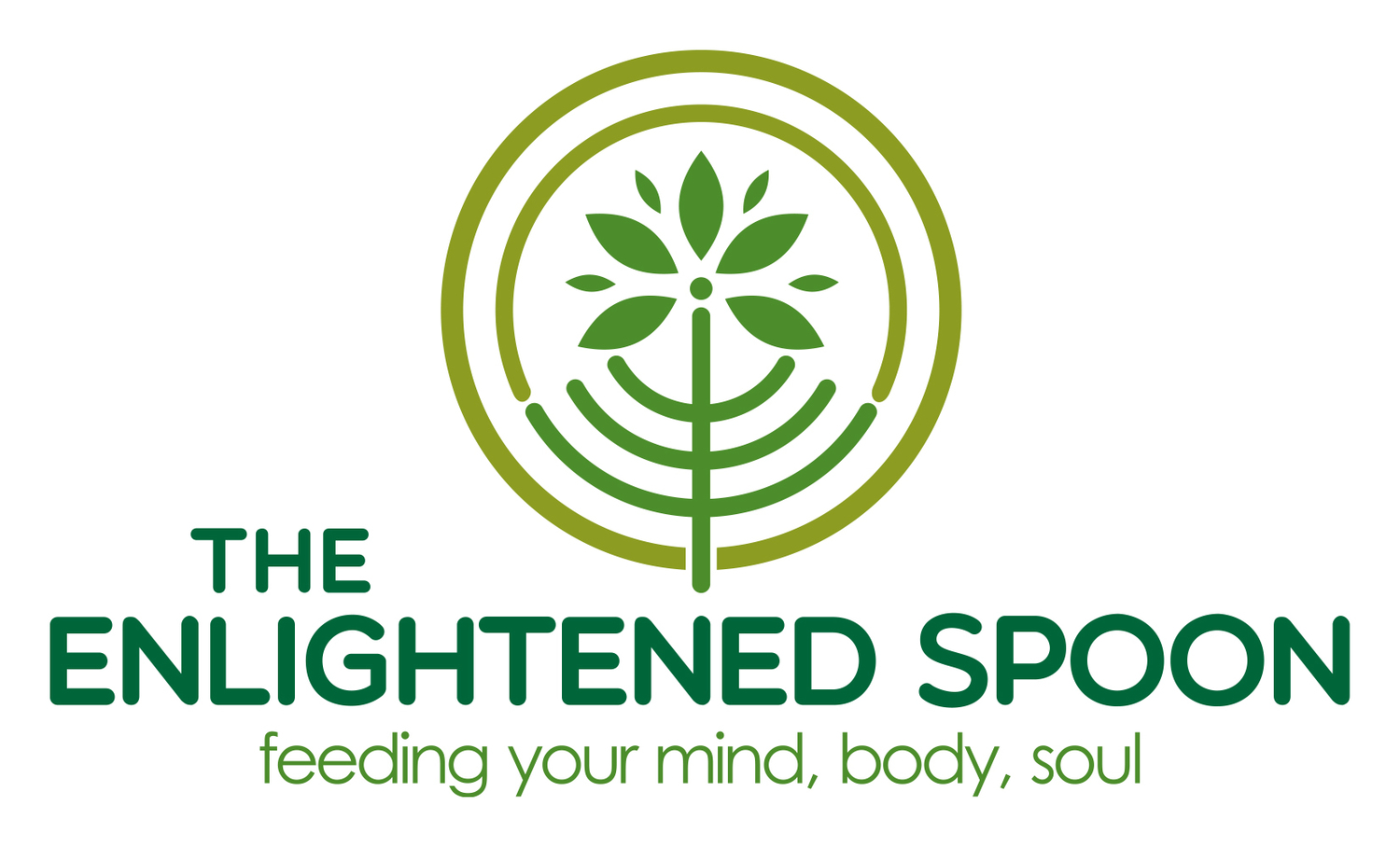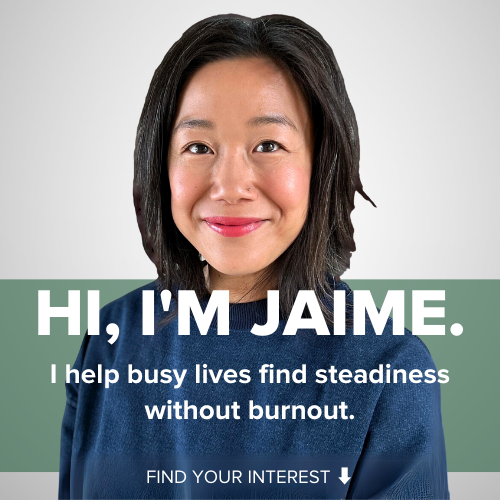13 Practical Tips on How to Deal with Stress at Work and Home
/In this week’s video, I’ll take you through 13 tips covering all the practical things you can do to reduce your stress levels. Some of these tips are fast and easy, a few might require you to change some habits so depending on the kind of person you are may take a bit longer - but they’re ALL going to help you reduce your stress levels practically at work and at home.
Don’t have 8 minutes to watch this? Then read the transcript of the 13 tips below.
TRANSCRIPT:
In today’s video, I’m gonna tell you how to deal with stress at work and at home - with practical lifestyle tips you can use in daily life.
I’m Jaime Tan, wellness coach, yoga + meditation teacher and nutritional therapist helping overworked high achievers manage stress through nutrition, movement and lifestyle rituals.
I’m ALSO an Executive Producer at one of the world’s top ad agencies, frequently shooting commercials with loads of celebrity talent and pro-athletes.
So when it comes to managing a busy, full-on life and reducing the overwhelm that can happen when you’ve got a lot going on - I’ve learned a few things I’d love to share with you today.
In the next few videos after this, I’ll break it down even more to give you the exact nutrition, movement and lifestyle considerations you need to help you relax, so if you’re looking forward to this, give this video a like, hit subscribe to follow this channel so you’re informed when the next video comes out.
So let’s get down to it.
1. Take a time-out
What’s your version of a time-out? Step away from the stressful situation, take 5 minutes to walk around the block outside. Change up the energy by physically changing your environment. Remove yourself from the stressful situation if you can. Some fresh air always helps to clear the mind and emotions.
2. Eat well-balanced meals at regular intervals
What does this have to do with reducing stress? You want to maintain a constant energy level, so don’t skip meals and ensure you get a good mix of macronutrients - proteins, fats and carbohydrates at every meal, at regular intervals.
In the next video, I’ll do a deep dive into what you should be eating throughout the day in order to help reduce your stress and anxiety levels, so stay tuned for that.
3. Limit alcohol, sugar and caffeine
These can aggravate anxiety and trigger panic attacks as they’re artificial stimulants. So try to reduce or limit your intake of alcohol, sugar and caffeine.
Check my previous video on whether coffee is “good” or “bad” especially in high-stress situations and what are some of the caffeine-free alternatives you can do instead.
4. Get enough sleep
Sleep regulates so many of our hormonal patterns, including our stress hormones. If you’re not sleeping enough, or not getting great quality sleep, then you’re not allowing your body to go into deep rest and that’s when deep repair happens in the brain and all throughout the body.
Check my 5-part Sleep Series on how to get better sleep. It includes your power-down rituals at the end of the day, the foods that help and aggravate sleep, the natural supplements and meditation practices to help you get better sleep.
I’ve also got a free sleep meditation in there, so make sure you check that out.
5. Move daily
Physical movement is so important to not only keep things moving - as in the bowels. Yup! Really important for good health.
Moving daily also helps us feel well physically, emotionally and cognitively. So we function more productively, maintain a healthy weight and bone density.
It’s not just about the exercise or workouts you’re doing to help you feel good and maintain your health for that 45 minutes or an hour of your day. It’s also about the total movement you’re getting throughout the day.
In an upcoming video, I’ll take you through why your HIIT training is adding to your stress levels, and what you can do instead so as not to burnout because of how you’re working out.
Interested? Hit the subscribe button so you’ll get notified when I post new videos.
6. Take deep breaths
Deep belly breathing allows the parasympathetic nervous system (our “rest + digest” mode) to override the sympathetic nervous system (our “fight or flight” mode).
Check my previous video on “diaphragmatic breathing” for this simple breathing exercise you can do to engage deep belly breaths.
7. Journal it
Write down all of the thoughts, anxieties, frustrations, worries on paper (or type it digitally if that’s your jam). Having a way to express how you feel - no one else has to read it - can really help you release the burden of whatever’s stressing you out.
Use writing as your outlet.
8. Supplements
There are so many great supplements to help reduce stress, but you’ll want to work with a nutritionist or therapist to know exactly which ones and in which combinations, will help YOU.
Please check with your medical practitioner especially if you’re on prescribed medications before you take any of these:
Magnesium
Vitamin B6
Vitamin D
Omega-3
L-theanine
Lemon balm
Rhodiola
Passionflower
Camomile
Ashwagandha
These are just a few examples I’ve got in my toolbox, and they’re all great supplements that can help support and relieve stress.
9. Scents - Essential oils
Scents are the fastest, one of the most inexpensive ways to instantly lift your mood. Think about when you last walked into a spa and the smell of the lavender, jasmine, vanilla hit you, and you instantly felt Zen.
Use that oil diffuser at home or at work!
10. Spend time on your own (especially for introverts)
If you’re an introvert like me, you’re probably already aware of how much time you need to spend on your own. You might need to check in and see if it’s time to schedule some “me time” soon.
11. Spend time with friends or family
We’re ultimately social animals, so some form of connection with community is important. Even if you’re stuck at home in some kind of lockdown situation in 2020, use the virtual hangouts like Zoom or FaceTime to stay close to the people that matter to you.
People are not your thing? Pet an animal, talk to your plants. Go hang out in your nearest park and you’ll get both!
12. Laugh
Too often we’ve forgotten how to keep it light, have some fun. Bring back the joy. Watch some stand-up comedy, listen to hilarious podcasts - I recommend Conan O’Brien Needs a Friend.
I know you’re busy with lots of sh*t to do, but not everything has to be about productivity and maximising your time. And actually even if it is, laughing and getting down time will help you be more productive later. Researched fact.
13. Draw Boundaries
Say “no” more often. Know what your priorities are. Protect your time.
And it’s OK to tell people “no” in all these ways:
No thank you.
Maybe later.
Not right now.
Let me think about it and get back to you.
You’re not being a bad person by saying “No”.
In fact, you’re doing yourself a favour by protecting your time and energy, so you can show up more fully later.
So there you go. 13 practical tips on how to better deal with stress at work and at home. Questions? Comments? Ask me! Tell me in the comments below.
In the next video: What to eat to more effectively manage stress, yes you can help manage stress through your diet - so you want to hit the subscribe button and notification bell for when it drops next week.
Need More Help?
If you need more guidance on how to create your own personal rituals around the right nutrition and fitness activities that work for you to better manage your crazy, busy life - I’m here to help.
I offer a free session to help you get clear on what’s not been working for you and how to get more rested and get your energy levels back to high vibes. Book your call here.








